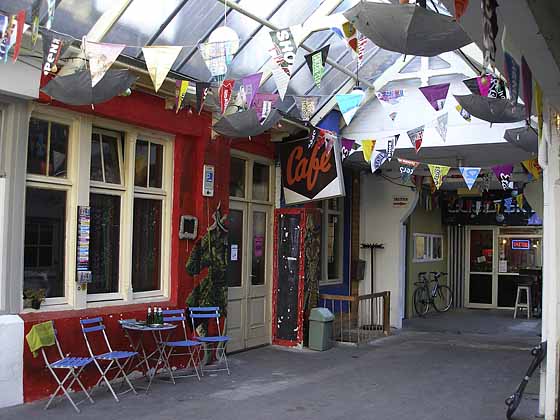
Earlier this year squatting was made illegal in the Netherlands. This ban had been threatened for a long time, but only found a majority in parliament now, just one symptom of the rightward trend in politics here. A depressing development that showed how weak and irrelevant the squatting movement had become. At one time the movement, in all its forms had been hugely powerful and been widely supported, despite (or perhaps, because) having huge running battles with the police during the late seventies and early eighties. A longterm shortage of affordable housing in the major cities, a situation that existed ever since the war, combined with conspicously empty but perfectly good buildings deliberately kept empty by private speculators as well as city councils, especially in Amsterdam meant squatters had a lot of sympathy amongst ordinary people. Squats were — and are — also nuclei of alternative culture, a cheap or even free space for all sorts of cultural activities less likely to find a place elsewhere. But with the easing of the housing shortage and the gentrification of the inner cities, the squatting movement has lost much of its attraction and support. It has shrunk considerably, down to a hardcore of idealists and a few more tourists and ironically has also become much less violent than it used to be. (Said violence of course mostly used in self defence against the much more violent opposition of police and the slumlords’ bully boys.)
With squatting seemingly no longer necessary and the movement largely moribund, it was no wonder rightwing parties finally could muster enough votes to make it completely illegal. This despite a long established jurisprudence that had established that the act of squatting itself could not be illegal. It was a symbolic act as much as anything, a way to stick the knife into an old enemy. At first it even seemed most city councils confronted with squatters were going to ignore the law, dealing with them as they had always done, on a case by case basis. But since then it seems the tide has turned and even a squatting friendly city like Amsterdam has become more active with squat clearings.
Until now.
Because yesterday the court in Den Haag decided that new law or not, the city council cannot clear out a squat without at the very least giving the people living there a chance to put their case to the court. It argued that the European laws and jurisprudence on human rights had established that the right to a home life meant that people cannot be chucked out of their homes without a court order. Because of this judgement, several planned clearances here in Amsterdam had to be postponed, as the city council had to study the judgement to see if it applied to them or not, the first good news the squatting movement has recieved in the last few years. What’s more, if the judgement is upheld and not overthrown by a higher court, it means that each new clearance has to be publicised by the officier van justitie (D.A.), giving squatters the opportunity to appeal to the courts for each case, delaying or even stopping individual clearances and in general making the whole process much more costly.
It’s only a partial victory, squatting is still illegal, and it’s typical of the weakness of the squatters and their allies that it comes from the courts rather than the streets, but it it’s a hopeful sign. The ruling shows that the new anti-squatting law has its limitations and it might just be in conflict with European law as well.